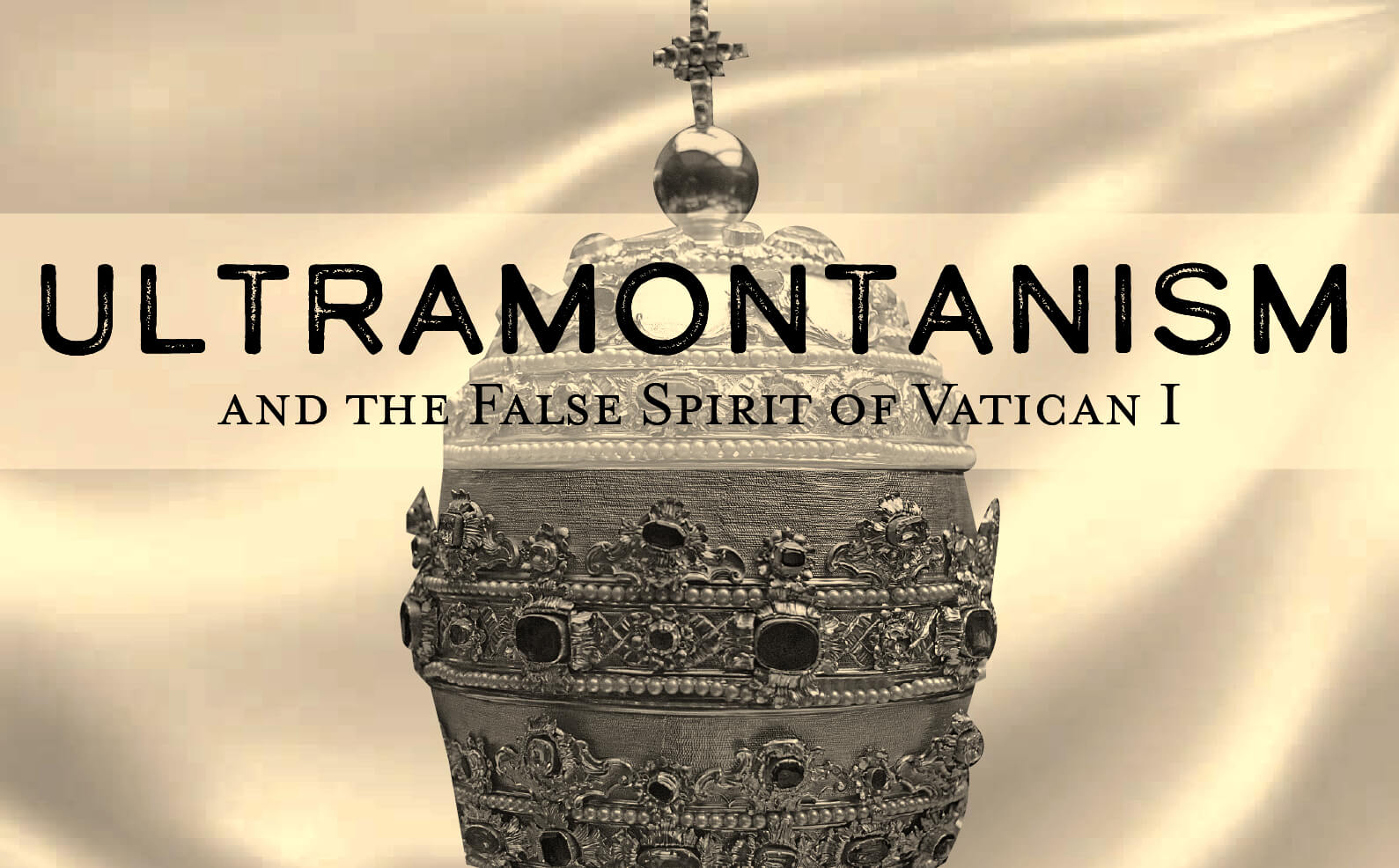The editor of OnePeterFive was kind enough to invite submissions regarding the origin of the excessive submissiveness of many Catholics to Pope Francis’s manifestly erroneous teachings and measures.
He says such attitude stems from “a false spirit of Vatican I” and what he calls hyperüberultramontanism. This seemingly humorous expression appears to be an anti-polemical hedge. Indeed, the masthead of the article (above) displays a pontifical tiara superimposed with “Ultramontanism and the False Spirit of Vatican I.” The absence of the precautionary prefix hyperüber was perhaps an oversight, but it is revealing nonetheless.
I accept the invitation and begin by saying that I agree with Peter Kwasniewski’s observation in a recent article that restricting oneself to the “Magisterium of the moment” is contrary to Church teaching. It means to ignore Scripture and Tradition and accept non-infallible novelties from the current pope and bishops as the only way to know the truth. I fully agree with his use of magisterial and hyperpapalist to designate those Catholics who adopt this adulterated obedience. While he used “ultramontanism” to refer to such Catholics in the past, he did not do so now.
Last year, I wrote two articles at OnePeterFive (here and here) and one at RorateCaeli to address the traditionalist mischaracterization of ultramontanism. I demonstrated three things:
(1) The future Cardinal Edouard Pie, the most prominent leader of the French ultramontanes during the First Vatican Council, had a very balanced concept of papal monarchy and the limits of the Roman pontiff’s magisterial and governing authority;
(2) the abusive demand that the faithful adhere unrestrictedly to a reigning pope’s non-infallible teachings and acts of government came from the Liberal current during the papacy of Leo XIII, who demanded that Monarchist French Catholics accept their country’s secular Masonic Republic; and,
(3) The popes closest to the Liberal current—Benedict XV, Pius XI, and the conciliar popes—aggravated that abuse throughout the twentieth century. The process culminated with the current pontiff’s totalitarianism, which led Henry Sire to call him, quite adroitly, The Dictator Pope.
In his turn, Prof. Roberto de Mattei wrote an article providing the context of the controversy between ultramontanes on the one hand and Gallicans and Liberals on the other. He showed how Blessed Pius IX fully supported ultramontanism. He cited two examples showing how balanced the ultramontane current was. The first was a declaration by German bishops. They pointed out how the Magisterium of the pope and bishops “is restricted to the contents of the infallible Magisterium of the Church in general, and it is restricted to the contents of the Holy Scripture and tradition” (Denz.-H 3116). The second was a statement by Cardinal Manning, which was quoted by Michael Davies: “Infallibility is not a quality inherent in any person, but an assistance attached to an office.”[1]
Finally, Prof. de Mattei highlighted the paradoxical adoption by some sectors of traditionalism of the hostility toward ultramontanism shown by Dominican theologian Yves Congar. He was one of the main architects of the Second Vatican Council, and, in his Council diary, he railed against what he called the “wretched ultramontane ecclesiology.”[2] On December 9, 1962, he wrote, “everything that is done with a view to converting Italy to the Gospel from political, ecclesiological or devotional ultramontanism, is that much gained for the universal Church as well.”[3]
Only if the historical data furnished in the well-known historian’s article and my three is false would it be legitimate to continue blaming the ultramontane current for the unjustifiable acceptance of the current pope’s errors in teaching and governing the Church. However, it is wrong to do so if the facts are true. Therefore, those who attribute today’s hyperpapalist obsequiousness to the ultramontanes must first refute Prof. de Mattei’s and my articles. They should provide more conclusive historical data than what we presented.
That has not happened so far. No one has refuted what Prof. de Mattei and I have written.
I draw attention to this incoherence and ask anti–hyperüberultramontanes to be intellectually honest. They must either refute what Prof. de Mattei and I wrote or stop mischaracterizing ultramontanism. Moreover, they should admit that history shows that magisterialism and hyperpapalism are the spurious fruits of the Liberal Catholic current, which resorts to authoritarianism to impose its errors.
I invite our anti-ultramontane traditionalist friends to a more elevated debate.
Links in this post earn affiliate income for OnePeterFive.
[1] Michael Davies, Pope John’s Council (Chawleigh, Chulmleigh [Devon]: Augustine Publishing Company, 1977, 175.
[2] Yves Congar, My Journal of the Council, trans. Mary John Ronayne and Mary Cecily Boulding (Adelaide, Australia : ATF Press, 2012), 485.
[3] Ibid., 247.


